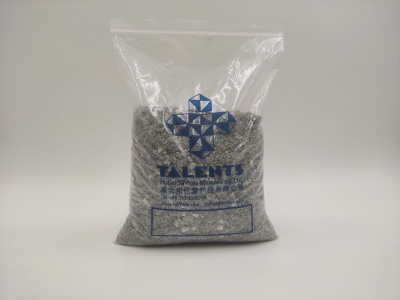Coated Sodium Sulfate
Product Features:
The refractive index of the product is 1.484, same as most of the synthetic resin, the optical property is excellent.
With special wet processing surface coated, high activation, low oil absorption, good distribution, good affinity with many kinds of resin, make the final product good mechanical property, improve the filling rate, reduce the final cost.
High L value could guarantee the final product high glossy and good bright.
With special surface processing formula, which avoids the final product freeze-out.
Synthesis Process:
This product produced with high purity sodium sulfate coated the surface with special wet processing technology, then spray drying and become special particle size anhydrous sulfate powder
Application Areas:
Transparent filler masterbatches
Modified plastic
Index | TLZ-SS01 | TLZ-SS02 |
Na2SO4 content ≥% | 99.0 | 99.0 |
Particle Size D50 μm | 3.5 | 1.8 |
325 mesh Residue ≤ % | 0 | 0 |
Whiteness % | 96 | 97 |
Activation Grade ≥% | 99 | 99 |
Moisture ≤% | 0.10 | 0.10 |
Water Insoluble ≤% | 0.02 | 0.02 |
PH Value | 7.5±1.0 | 7.5±1.0 |
Ca + Mg (as Ca) ≤% | 0.01 | 0.01 |
Chloride (as Cl) ≤% | 0.10 | 0.10 |
Fe ≤% | 0.001 | 0.001 |
Coated Sodium Sulfate is a modified form of sodium sulfate that features a specialized outer coating to enhance its stability, control its solubility, and improve its performance in various industrial applications. As industries evolve towards more advanced and efficient chemical formulations, the demand for coated sodium sulfate continues to rise.
What Is Coated Sodium Sulfate?
Coated Sodium Sulfate refers to sodium sulfate (Na₂SO₄) that has been treated with a surface coating—typically made from polymers, resins, or other chemical compounds—to alter its interaction with external elements such as moisture, heat, and other reactive chemicals. The primary function of the coating is to control the dissolution rate and improve handling during manufacturing processes.
The base sodium sulfate is usually in the form of a crystalline powder or granule, and the coating is applied uniformly to ensure performance consistency.
Why Use Coated Sodium Sulfate Instead of Regular Sodium Sulfate?
There are several reasons industries prefer coated sodium sulfate over its uncoated counterpart:
Moisture Resistance: The coating prevents the product from absorbing ambient moisture, making it ideal for humid environments.
Controlled Release: Coated sodium sulfate dissolves more slowly, which is advantageous in detergents and pharmaceuticals.
Dust Reduction: Coating reduces dust generation, which improves workplace safety and cleanliness.
Enhanced Compatibility: The product is more compatible with sensitive formulations in the detergent, textile, and chemical industries.
Applications of Coated Sodium Sulfate
Detergent Industry: Coated sodium sulfate acts as a filler and flow aid, ensuring uniform distribution of active ingredients.
Glass Manufacturing: Used as a fining agent to remove small air bubbles during glass formation.
Textile Industry: Serves as a leveling agent in dyeing processes.
Chemical Formulations: Ideal for products requiring delayed solubility or controlled interaction.
Pharmaceuticals: Occasionally used in non-active roles like tablet compression, where moisture control is crucial.
Market Demand and Global Trends
The global market for coated sodium sulfate has been expanding steadily, driven by the increasing demand for eco-friendly, stable, and efficient chemical additives. According to recent reports, Asia-Pacific remains the largest consumer, especially in detergent and textile industries.
Coated sodium sulfate is also gaining popularity in eco-conscious product development. Manufacturers are seeking coatings derived from biodegradable or non-toxic materials, which can meet stringent environmental regulations.
Advantages of Coated Sodium Sulfate in Manufacturing
Improved Storage Stability: Coated sodium sulfate maintains its properties longer during storage, reducing waste.
Efficient Processing: Reduced clumping and improved flowability help in high-speed manufacturing.
Environmental Safety: Certain coatings are designed to be environmentally friendly, supporting sustainable industrial practices.
Choosing the Right Coated Sodium Sulfate Supplier
When selecting a supplier for coated sodium sulfate, it's important to consider:
Coating Material: Ensure it aligns with your formulation goals.
Particle Size Uniformity: Affects solubility and compatibility.
Moisture Resistance Ratings: Critical for applications in humid or temperature-variable environments.
Regulatory Compliance: Coated sodium sulfate must meet REACH, RoHS, and other regional standards.
Working with a supplier that provides technical documentation, samples, and customization options is vital for optimal integration into your production process.
Future Innovations in Coated Sodium Sulfate
As technology progresses, new innovations in coated sodium sulfate are emerging, including:
Smart Release Coatings: Designed to respond to pH or temperature changes.
Nano-Coating Technology: Enhances performance at the microscopic level.
Sustainable Coatings: Made from biodegradable or plant-based materials.
These advancements are poised to increase the application scope of coated sodium sulfate in fields like agriculture, biotechnology, and specialty chemicals.
Conclusion: Why Coated Sodium Sulfate Is the Industry’s Smart Choice
In conclusion, coated sodium sulfate offers unmatched versatility, safety, and performance across a wide range of industries. Its ability to provide controlled solubility, resist moisture, and ensure better compatibility makes it a vital component in modern manufacturing.
As global demand continues to grow, businesses that adopt coated sodium sulfate in their formulations stand to gain a competitive edge—both in product performance and operational efficiency.





